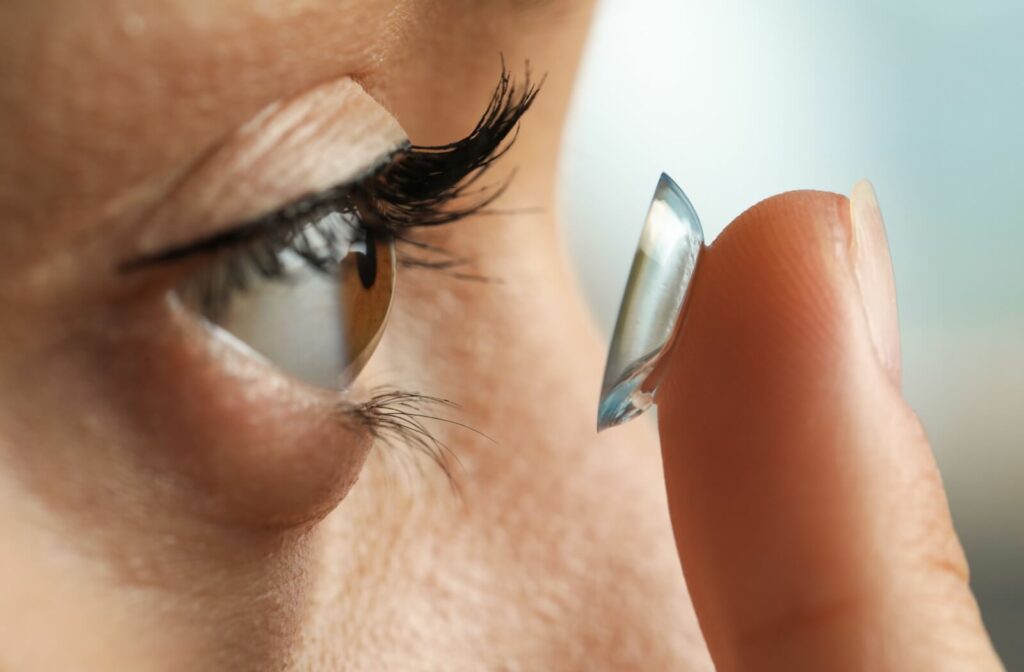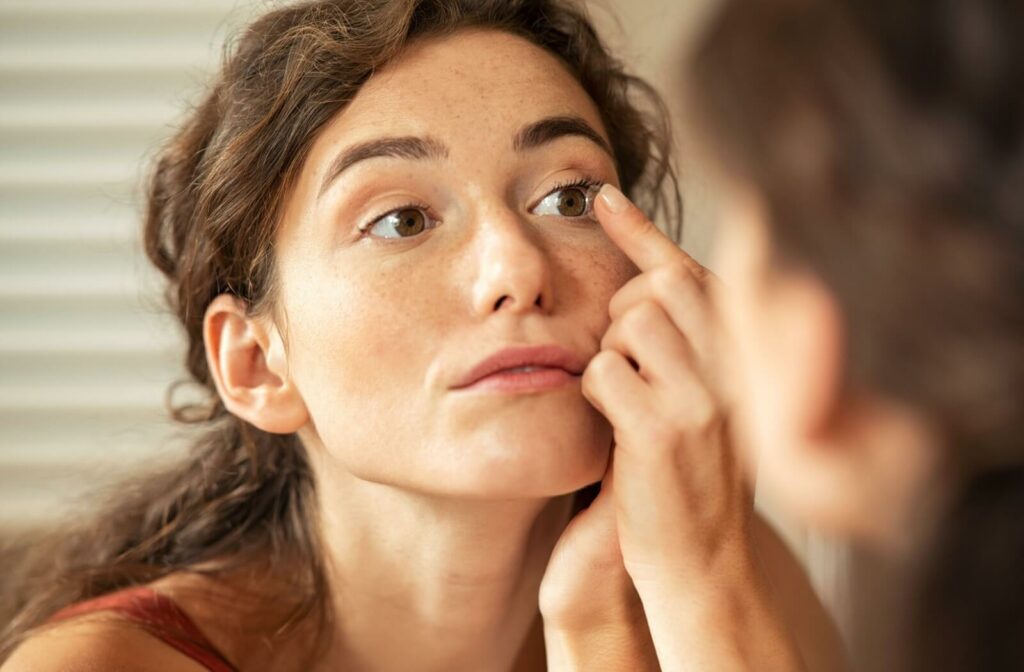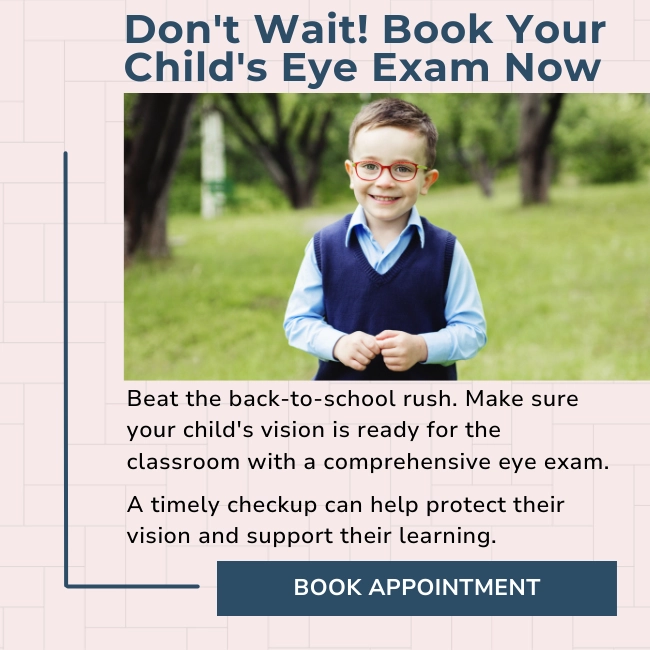If you’ve been struggling with dry eye, you know how frustrating it can be. Experiencing discomfort, redness, and irritation daily can be a constant battle, especially for contact lens wearers.
Many people with dry eye struggle to find lenses that provide comfort without exacerbating their symptoms. Fortunately, there are several options specifically designed to keep your eyes moist and comfortable throughout the day including:
- Soft Contact Lenses
- Silicone Hydrogel Lenses
- Scleral Lenses
- Hybrid Contact Lenses
What Is Dry Eye Syndrome?
Dry eye syndrome is a common condition where your eyes don’t produce enough tears or the right quality of tears to stay comfortable.
This can lead to symptoms such as:
- Itching
- Burning
- Gritty sensation in the eyes
What Causes Dry Eye?
Age, environment, and certain medical conditions can contribute to dry eye syndrome. Understanding the underlying causes can help in managing the condition more effectively.
People with dry eye syndrome often find wearing contact lenses particularly challenging. The lack of moisture can make lenses uncomfortable to wear, sometimes exacerbating the symptoms.
This is why choosing the right type of contact lenses is crucial for anyone dealing with dry eyes. Proper management can alleviate much of the discomfort, making your daily life more enjoyable.
How Contact Lenses Affect Dry Eyes
Contact lenses sit directly on the eye’s surface, which can interfere with the natural tear film. The tear film is essential for keeping the eyes moist and comfortable.
When the tear film is disrupted, it can lead to dryness and irritation. Different types of contact lenses interact with the tear film in various ways, which is why some lenses are better suited for dry eyes than others.
Traditional contact lenses can sometimes absorb the eye’s natural moisture, making dry eye symptoms worse. However, advancements have led to the development of lenses specifically designed to help retain moisture.
These lenses can provide a more comfortable wearing experience for those with dry eye syndrome.
Soft Contact Lenses
Soft contact lenses are a popular choice for many people, including those with dry eyes. These lenses are made from flexible materials that allow oxygen to pass through to the cornea, which can help maintain eye health and reduce dryness. Soft lenses are generally comfortable and easy to adapt to, making them a convenient option for many wearers.
One of the advantages of soft contact lenses is their ability to stay hydrated throughout the day. Many soft lenses are designed with materials that retain moisture, providing relief from dry eye symptoms.
They’re also available in various wear schedules, including:
- Daily
- Bi-weekly
- Monthly
However, not all soft contact lenses are created equal. Some may still cause dryness, especially if worn for extended periods. Daily disposable lenses are generally better for dry eyes, as they reduce the need for preservative-containing solutions, resulting in less build-up on the lenses.
Choose high-quality lenses specifically designed for dry eyes to maximize comfort. Always follow your optometrist’s recommendations for the best results.
Silicone Hydrogel Lenses

Silicone hydrogel lenses are a type of soft lens that offers enhanced breathability. These lenses allow more oxygen to reach the cornea compared to traditional soft lenses, which can help reduce the risk of dryness and irritation.
Silicone hydrogel lenses are an excellent option for those who experience dry eyes but still want the comfort and convenience of soft lenses. Other benefits of hydrogel lenses include:
- They’re designed to retain moisture better than standard soft lenses. The material used in silicone hydrogel lenses helps maintain a stable tear film, reducing the symptoms of dry eyes.
- They’re available in various wear schedules, such as daily, bi-weekly, and monthly disposables, providing options to suit different preferences.
While silicone hydrogel lenses offer many benefits, it’s essential to ensure they are appropriately fitted to your eyes.
Scleral Lenses
Scleral lenses are a type of gas-permeable lens that covers the entire corneal surface and rests on the sclera (the white part of the eye).
These lenses create a tear-filled reservoir that provides continuous moisture to the eye. Scleral lenses are custom-designed to fit each eye, ensuring maximum comfort and effectiveness.
Benefits of Scleral Lenses
- One of the significant advantages of scleral lenses is their ability to protect the cornea and provide a stable tear film. This can significantly reduce the symptoms of dry eyes and improve overall eye health.
- Scleral lenses are also known for their durability and long lifespan, making them a cost-effective option in the long run.
However, scleral lenses require a precise fitting by an optometrist. Our team at Trail Vision Care Clinic can ensure a comfortable and accurate fitting. Regular follow-up appointments are essential to ensure the lenses fit correctly and provide the desired comfort.
Despite the initial adjustment period, many users find scleral lenses a game-changer for managing dry eye symptoms.
Hybrid Contact Lenses
Hybrid contact lenses combine the best features of gas-permeable and soft lenses. They have a rigid centre that provides clear vision and a soft outer ring that offers comfort. This unique combination makes hybrid lenses a good option for people with dry eyes who need the visual acuity of gas-permeable lenses but the comfort of soft lenses.
The rigid centre of hybrid lenses helps maintain a stable tear film, reducing dryness and irritation. The soft outer ring ensures that the lenses are comfortable to wear, even for extended periods.
Ready to Try Contact Lenses for Dry Eye?
Choosing the right contact lenses for dry eye can significantly improve your comfort and quality of life. By understanding the different types of lenses available and considering factors such as material, oxygen permeability, and moisture retention, you can find the best lenses for your needs. If you’re ready to find the perfect contact lenses for dry eye, book an appointment with the team at Trail Vision Care Clinic.




